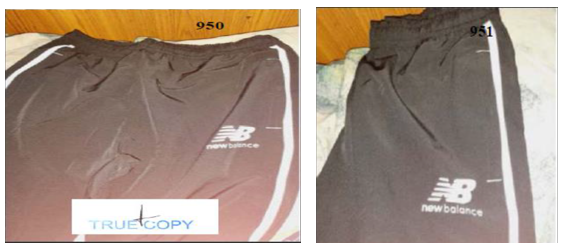The problem of counterfeiting, which especially involves the trademarks of another entity as their own, continues to be of major concern for India and involves the production, distribution, and sale of a variety of fake goods on a large scale.
In the recent case of New Balance Athletics vs Salman Khan and Anr., the plaintiff filed a suit against the Defendants seeking a permanent injunction to restrain the Defendants from infringing its registered marks “NEW BALANCE”/ and from selling counterfeit goods. The factual matrix of this case is that the plaintiff is a registered proprietor of various marks, including the marks “NEW BALANCE”
and from selling counterfeit goods. The factual matrix of this case is that the plaintiff is a registered proprietor of various marks, including the marks “NEW BALANCE”  and (hereinafter collectively referred to as “NB marks”) in classes 18 and 25 in respect of footwear and readymade clothing. The plaintiff claimed they have used the mark “NEW BALANCE” in the USA since 1951 and India since 1986. The plaintiff further submitted that using the abbreviated
and (hereinafter collectively referred to as “NB marks”) in classes 18 and 25 in respect of footwear and readymade clothing. The plaintiff claimed they have used the mark “NEW BALANCE” in the USA since 1951 and India since 1986. The plaintiff further submitted that using the abbreviated  / “NB” marks commenced in 1986 in India. The plaintiff’s organisation, with over 8000 employees, pertained to a business widespread in over 120 countries in relation to goods such as footwear and readymade clothing bearing the NB marks. The plaintiff’s business and NB marks have gained sufficient goodwill and reputation.
/ “NB” marks commenced in 1986 in India. The plaintiff’s organisation, with over 8000 employees, pertained to a business widespread in over 120 countries in relation to goods such as footwear and readymade clothing bearing the NB marks. The plaintiff’s business and NB marks have gained sufficient goodwill and reputation.
Further, the plaintiff owned and operated the website www.newbalance.com. The plaintiff also claimed to own over 300 country code domain names, including domain names that incorporate the plaintiff’s marks, such as nbathletics.com, newbalanceathletics.com, nbdetroit.com, etc. The plaintiff also submitted its sales for 2019 and 2020, along with the advertisement and promotional expenditure incurred by the plaintiff for the promotion of its NB marks through online and offline modes. The plaintiff further submitted a few enforcement orders passed by the Court to safeguard its NB marks against infringement and passing off. In view of the above, the plaintiff alleged that the Defendants were selling counterfeit goods, such as readymade clothes, using the Plaintiff’s NB marks through offline and online modes such as IndiaMart, Myntra, etc. The plaintiff placed on record the following screenshots of the Defendants corroborating the above:

During the proceedings of the case, a Local Commissioner was appointed by the Court vide its order dated August 17, 2022, and was directed to visit the Defendants’ premises, who were engaged in the sale of counterfeit products using the NB marks of the plaintiff. The report by the Local Commissioner confirmed that at the premises of Defendant No. 1, various counterfeit sports apparel, including apparel bearing Plaintiff’s NB marks, were found. These products were obtained from Defendant No. 3. On the visit to the factory of Defendant No. 3, it was reported that the defendant obstructed the execution of the commission and failed to provide the keys to the factory. In this regard, Defendant No. 1 submitted that the defendant was, in fact, selling counterfeit products; however, the said products were manufactured and supplied by Defendant No. 3, and thus, he was not indulged in any conscious violation or infringement of the plaintiff’s registered NB marks, as he was merely a dealer of the goods which were sourced from the manufacturer. In this regard, the Court opined that such a ground is merely a ground of defence as the sale of counterfeit goods bearing deceptively similar marks is as much a tort of infringement or passing off as the manufacture of such goods.
The Court decreed the suit under Order VIII Rule 10 of the Code of the Civil Procedure, 1908 and relied on its judgement in Louis Vuitton Malletier v. Capital General Store, and reiterated that counterfeiting was a serious social evil which erodes brand value, which may have been gained over a long period of time by any brand. It was held that the plaintiff made out a clear case of infringement and passing off by the Defendants of their products bearing the Plaintiff’s NB marks as the products of the plaintiff. Accordingly, a permanent injunction was granted in favour of the plaintiff and against the Defendants. Further, the Defendants were also directed to pay the actual costs of the suit to the plaintiff, for which the matter is now placed before the Taxation Officer for computation.
This judgment throws light on the crucial topic that the manufacture and sale of counterfeit goods is an evil that exists in society today and is proliferating. Any person or organisation cannot protect itself from infringement by taking the defence that it sells counterfeit goods but does not manufacture them. Specific measures need to be taken and put into effect to prevent such counterfeiting of goods.



